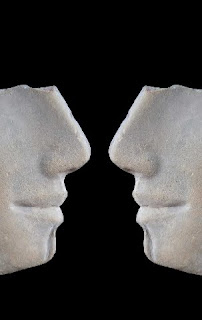 After excessive exposure to some of his works (anyone for yet another version of A Midsummer Night's Dream or Romeo and Juliet? No?), it’s easy to get excited about a production of a Shakespeare play that’s rarely performed. And no, I don’t mean that recent publicity stunt by Arden of his supposed lost work, Double Falsehood, but rather that late late play, Henry VIII, or All Is True. Its delayed appearance at the new Globe might be understandable given that an early performance razed the original in 1613. The more cynical, however, may suggest that its less than stellar reputation in the canon is to blame.
After excessive exposure to some of his works (anyone for yet another version of A Midsummer Night's Dream or Romeo and Juliet? No?), it’s easy to get excited about a production of a Shakespeare play that’s rarely performed. And no, I don’t mean that recent publicity stunt by Arden of his supposed lost work, Double Falsehood, but rather that late late play, Henry VIII, or All Is True. Its delayed appearance at the new Globe might be understandable given that an early performance razed the original in 1613. The more cynical, however, may suggest that its less than stellar reputation in the canon is to blame.It’s all too easy to knock this play as a collaboration, as though John Fletcher somehow contaminated the ‘genius’ of Shakespeare. Some of the best bits for my money – Katharine’s showdown with the two cardinals (“O, good my lord, no Latin!”), Wolsey’s repentance, Cranmer’s prophecy – are all from Fletcher’s pen. Instead, it’s an overall unity that seems to be lacking. Having spent the first half investing in the parallel downfalls of Katherine of Aragon and Cardinal Wolsey, it’s quite surprising that they are pretty much gone from the narrative by the end of Act 3.
All the more pity, since Ian McNeice and Kate Duchêne offer very watchable performances as these perennial outsiders who have more in common that they would care to admit. His Cardinal Wolsey is all jowls and entitlement, unaware that his own expenses scandal is about to hit, while Duchêne makes an excellent case for Katharine being considered among Shakespeare's leading heroines.
This is not an easy play to understand, but for the most part, Angela Davies’ set design helps the clarity immensely. The space outside the Globe pillars is rigidly separated from the space within by the simple use of a red carpet, giving the effect of an inner sanctum from which corridors of power and influence emanate. The introduction of a court fool with boy puppet, although brilliantly played by Amanda Lawrence, is less effective. The spectre of a male heir is already writ large in this play and its visual representation often detracted from those words, most notably in Katharine's trial scene, where it mugged and upstaged from behind Henry's throne.
Henry somewhat struggles to be the hero of his own play, eponymous though he may be. It should be stressed though that this is not the fault of Dominic Rowan, who brings his typically sophisticated touch to the interpretation. Rather, Henry seems to be a casualty of both the play's episodic structure and of Mark Rosenblatt's directing. The transformation of Henry into his Holbein portrait persona at the end is a nice touch, but at times it feels a bit like Rosenblatt has been more concerned with the minutiae of historical accuracy - depicting offstage events is indicative of this - than with exploring the play's inherent rejection of the idea that there is only one historical truth. Or, that all is true.
Tickets:
£5, yard standing ticket.
Programme:
£3.50.
Total Cost:
£8.50
Henry VIII is in repertory at Shakespeare’s Globe until 21 August 2010. For tickets and further information visit the website, or phone Box Office on 020 7401 9919.






